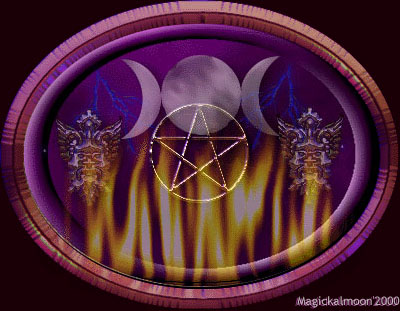
What is Paganism?
Paganism is not new or unusual in our modern life. For many people it exists less as an active religion than as parts of our popular culture. Halloween costumes and treats, Christmas trees and mistletoe, Easter bunnies and eggs, maypole dances, harvest festivals and hundreds of other folkways began as Pagan practices. Modern-day Pagans seek to restore the religious context of these practices. Defining Paganism - the origin of the word pagan is from the Latin paganus, meaning a country dweller. When cities were Christianized the people in the country continued to practice the old religions. The word pagan took on the meaning of "those folks out there in the sticks who still do all that old-fashioned stuff." Later it came to mean any member of an indigenous folk or tribal religion or anyone who was not "of the Book" (i.e., the Koran, Bible, Torah). Pagan religions originated in a time when people lived close to the land. Pagan theologies reflect an awareness of nature with its cycles of the seasons, as well as the cycles and seasons of human life. Such awareness is a common thread among Pagans today. Few modern Pagans can fully know or follow how our ancestors worshiped. Instead we invent and reinvent our religious practices, and even our beliefs, as we determine how they resonate with our contemporary lives. Some people prefer to use the word "Neo-pagan" to describe this form of modern Paganism. We capitalize the words Pagan and Paganism in accordance with standard practices for religious names, e.g., Buddhist and Buddhism, Muslim and Islam. Paganism is a vital, genuine -- and growing! -- spiritual path.

What Pagans Believe
Modern Pagan theology is like a great tapestry with strands originating in many distinct religious traditions. Contemporary Pagans may embrace all or part of the Pagan tapestry. Some Pagans explore their ethnic roots and discover the indigenous practices of their ancestors. Others incorporate indigenous practices that belong to a wide variety of cultures. Still other Pagans follow newly created practices. Common among these Pagans is their tie to nature in a way that resonates with their inner spiritual voice. Some Pagans believe in the Goddesses and Gods of the old religions and others do not. Many Pagans understand deity as immanent, in everything, and believe revelation is found in nature instead of written in scriptures. Some believe in an afterlife and that their actions in this life will determine their place in the next. Others believe only in this life and that their actions here are all that matters. Still others believe in reincarnation. Some Pagans believe in an active Spirit World while others do not. Because Paganism is a non-credit religion such divergent beliefs can exist together under one religious name.



